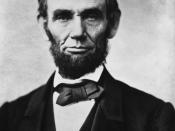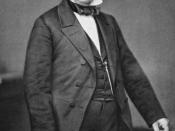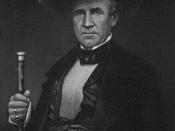Many historical figures contributed to the start of the Civil War. John Brown, for example, attempted to lead a slave rebellion in Virginia. The Southerners referred to him as a beyond radical abolitionist and murderer who was a threat to the South--leading to secession. Likewise, Brown's execution outraged many abolitionists and free-soilers in the North, making them angrier toward the South and therefore more likely to declare war on the South after they seceded. Stephen Douglas was also influential in this respect, particularly for his approval of the Kansas-Nebraska Act, which led to war in Kansas due to the disagreement between slaveowners and free-soilers. The Kansas-Nebraska Act proposed that Nebraska and Kansas both be admitted as territories with slave status based on popular sovereignty. Even more significant was the to-be Union president Abraham Lincoln. The South overspeculated on his political position, presuming him an abolitionist, and therefore posing a large threat to all the slave states.
This is what urged South Carolina to secede from the Union four days after Abraham Lincoln was sworn into office, as they felt they had lost all hope. In addition, Lincoln turned down the Crittenden Compromise, which favored the South by guaranteeing federal protection of slavery south of 36ð30', and slave-free status by popular sovereignty north of it. Had this compromise been accepted and put in place, the Civil War would have been delayed even further or possibly prevented outright.
A few other minor figures also helped escalate tensions between North and South that led to the Civil War. Harriet Beecher Stowe, for example, wrote Uncle Tom's Cabin, a highly influential book which emphasized the wrongfulness of slavery and stirred up spirits in the North and the mountain South, ever increasing their hatred of slavery. It is this hatred of slavery that...



Crittenden Compromise
It's not difficult to understand why Lincoln and others wouldn't be in favor of the Crittenden Compromise which many saw as an abandonment of principle. The so called compromise would have required half a dozen constitutional amendments. In the over 200 year history of the Constitution, it has been amended relatively few times. It was naive on the part of Senator Crittenden to believe that wholesale changes to the Constitution, which would have had the effect of forever preserving slavery in the land of the free, could be accepted in late 1860. The country had changed a great deal since its founding, and many were unwilling to embrace slavery, even if to oppose it meant war.
6 out of 6 people found this comment useful.